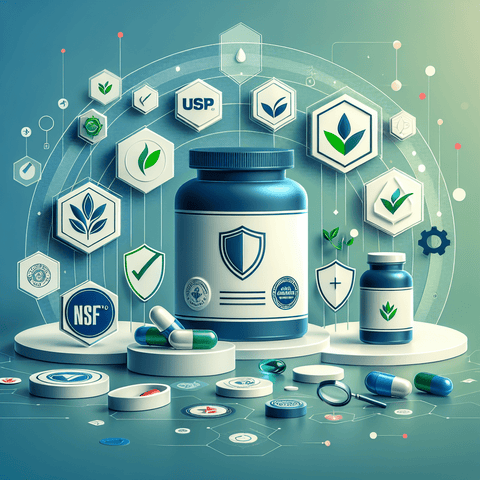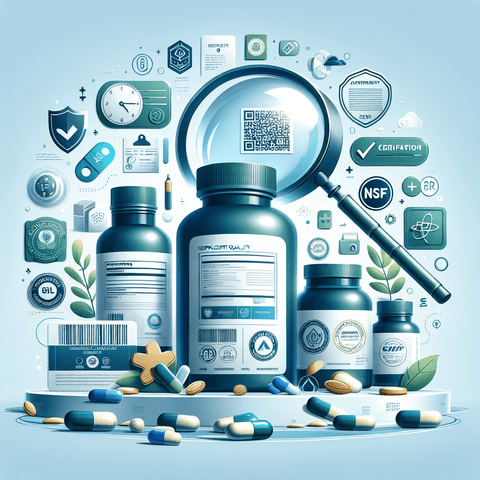Introduction
In today's booming health and wellness industry, dietary supplements have become a fundamental part of many individuals’ daily routines. From boosting immunity and enhancing athletic performance to supporting bone health and cognitive function, supplements promise numerous health benefits. However, the surge in supplement consumption also brings an increase in variability in product quality, safety, and efficacy. The key to navigating this complex marketplace lies in understanding and choosing the right supplement certification. Certification not only guarantees that a product meets certain safety and quality standards but also fosters consumer confidence and informed decision-making. This comprehensive guide aims to unlock the secrets to choosing the most trustworthy certifications for nutritional supplements, helping you make informed choices for your health and wellness journey.
Understanding Supplement Certification: What It Means for Your Health and Safety
Supplement certification refers to the process by which independent and authoritative organizations evaluate and verify that a dietary supplement meets predefined standards of safety, quality, and efficacy. These standards typically encompass manufacturing practices, ingredient authenticity, purity, and label accuracy. Certification is crucial because it serves as an unbiased confirmation that the product adheres to rigorous industry benchmarks.
In the vast and sometimes murky world of supplements, certified products provide a layer of assurance that the supplement has undergone assessments beyond simple manufacturer claims. These certifications are vital for consumer safety, as they significantly reduce the risk of ingesting contaminated, adulterated, or mislabeled products. For instance, uncertified supplements may contain contaminants like heavy metals, unlisted substances, or even banned compounds, all of which could pose serious health risks.
Consumers who prioritize certified supplements demonstrate a commitment to their wellness by choosing products that have been scrutinized by credible third-party organizations. This not only enhances confidence in product efficacy but also helps prevent potential adverse effects related to questionable ingredients or manufacturing practices. By understanding what supplement certification entails and its significance, consumers can become proactive health advocates, making informed choices that align with their health goals and safety considerations.
The Importance of Third-Party Testing in Ensuring Supplement Quality and Safety
Third-party testing is a cornerstone of trustworthy supplement certification, providing an external validation process that furthers transparency and accountability. Unlike manufacturer-led testing, third-party organizations are independent entities with no financial interest in the products they evaluate. They perform comprehensive analyses to confirm that supplements meet label claims and safety standards.
Key elements of third-party testing include potency verification, which ensures the supplement contains the declared amount of active ingredients; purity testing, which detects and measures contaminants such as heavy metals, pesticides, or microbial pathogens; and screening for banned or illegal substances, especially relevant for athletes, to prevent inadvertent doping violations. Microbial testing examines the presence of harmful bacteria or fungi that could compromise consumer health.
For consumers, opting for products that undergo third-party testing offers countless benefits: increased transparency, confidence in product integrity, and reassurance that the supplement is both safe and effective. Reputable third-party organizations such as NSF International, Informed-Choice, and the USP (United States Pharmacopeia) are recognized globally for their rigorous testing standards. These organizations certify supplements that meet stringent criteria, and their labels serve as indicators of quality assurance.
When selecting a supplement, it’s prudent to look for certification logos from these credible organizations. This small but vital detail on the packaging signifies that the product has been independently evaluated, aligning with your goal to source supplements that are safe, trustworthy, and effective in supporting your health objectives.
Quality Assurance Standards: Setting the Benchmark for Supplement Excellence
Quality assurance standards form the foundation of safe and effective dietary supplements. Prominent organizations such as NSF International, USP, and Informed-Choice establish guidelines that manufacturers must meet to earn certification. These standards encompass all aspects of production—raw material sourcing, manufacturing processes, testing, packaging, and labeling—aiming to deliver consistent, high-quality products to consumers.
For example, NSF International’s certification process ensures that products comply with strict standards related to ingredient safety, contaminant limits, and manufacturing practices. The USP (United States Pharmacopeia) provides a scientific standard for supplement potency, purity, and content uniformity, which many consumers recognize and trust. Informed-Choice emphasizes bans on prohibited substances, especially relevant for athletes and sport enthusiasts.
Achieving these standards involves an extensive review of the manufacturing facility, plant inspections, testing of raw ingredients, and ongoing quality checks. Maintaining certification requires continuous compliance and periodic re-evaluation to ensure every product batch meets the designated benchmarks.
What does this mean for your health? Standards driven by these organizations ensure you’re purchasing products with verified ingredients, free from harmful contaminants, and manufactured under strict quality controls. This adherence to high standards directly translates to better health outcomes and minimizes health risks often associated with substandard supplements.
The Certification Process: How Supplements Are Evaluated and Certified
The journey of a supplement from production to certified product involves a multi-layered evaluation process designed to uphold quality and safety standards. This process generally begins with the manufacturer submitting detailed documentation, including ingredient sources, manufacturing procedures, and quality control protocols. Manufacturers often undergo audits and inspections to verify compliance with Good Manufacturing Practices (GMP), a set of principles ensuring consistent quality and safety.
Once initial documentation and inspections are approved, the supplement product undergoes rigorous testing—either in-house or via third-party laboratories. Tests are conducted for potency, purity, microbial contamination, and the absence of banned substances. Certifications are granted based on meeting these criteria, and labels are updated to reflect the endorsement from the certifying body.
Certification is not a one-time event; ongoing compliance is crucial. Manufacturers often submit to periodic re-evaluations and product testing to retain their certification status. This cycle ensures that products consistently meet safety standards and that quality is maintained over time.
However, consumers should be aware of common challenges in the certification process, such as inconsistent testing protocols, mislabeling, or inadequate documentation from some manufacturers. These pitfalls highlight the importance of selecting products with reputable certifications and to remain vigilant about product sourcing.
Reputable Certifying Bodies: Your Guide to Trustworthy Certification Labels
Selecting supplements with labels verified by credible certifying organizations is instrumental in ensuring safety and efficacy. Leading bodies recognized in the supplement industry include NSF International, USP (United States Pharmacopeia), and Informed-Choice. Each maintains rigorous standards and certifies a wide range of supplement products and ingredients.
NSF International is renowned for its strict third-party certification that covers safety, labeling, and manufacturing practices. Its NSF Certified for Sport program is particularly trusted among athletes, as it tests for banned substances and contaminants.
The USP verifies supplement content through a well-established scientific standard, providing a recognizable mark of quality. USP-certified products must meet criteria for potency, purity, and dissolution, ensuring that consumers receive the intended benefits safely.
Informed-Choice emphasizes the absence of prohibited substances, instilling confidence among athletes and fitness enthusiasts who require sport-safe supplements. Their certification process involves extensive testing and facility inspections.
When reviewing product packaging, look for logos or seals from these organizations. These certifying labels serve as quick identifiers of quality assurance, helping you distinguish reliable products from less trustworthy options. Prioritizing certified supplements from reputable organizations aligns with your goal of choosing safe, effective, and trustworthy health products—for instance, when selecting products likehttps://www.topvitamine.com/collections/vitamin-c-benefits-immunity-antioxidant-energy or https://www.topvitamine.com/collections/vitamin-d-benefits-sources-safety.
Supplement Safety Compliance: Navigating Regulatory Standards and Industry Guidelines
The regulatory landscape for dietary supplements varies globally, but in many jurisdictions, regulators like the FDA (Food and Drug Administration) provide oversight to ensure consumer safety. Unlike pharmaceuticals, supplements are often classified as food products, which means they’re subject to different standards. Nevertheless, safety compliance remains paramount.
Industry guidelines, such as Good Manufacturing Practices (GMP), require manufacturers to adhere to quality standards related to ingredient sourcing, hygiene, contamination control, and labeling accuracy. These protocols are designed to prevent adulteration, contamination, and mislabeling, thereby safeguarding consumers.
Effective compliance involves rigorous ingredient testing, accurate label claims, and transparent production processes. Regulatory agencies periodically inspect manufacturing facilities and enforce recalls or sanctions if standards are violated.
For consumers, identifying compliant supplements involves examining product labels for GMP certification marks or regulatory approval seals, and sourcing products from well-known brands with transparent manufacturing practices. Staying informed about regulatory updates and industry standards empowers you to avoid adulterated or mislabeled products and choose supplements that uphold safety commitments.
How to Choose the Right Certified Supplement for Your Needs
Selecting a supplement that meets your health needs involves more than just picking a product at random. Here are some practical tips to guide your decision-making process:
- Look for certification logos: Always check for labels from reputable certifying bodies like NSF International or USP. These logos indicate independent verification of quality and safety.
- Understand label claims: Read ingredient lists carefully and verify that the product contains the active ingredients in the amounts declared. Be cautious of exaggerated health claims.
- Ask questions: Don’t hesitate to contact the manufacturer for detailed information about their testing procedures, sourcing, and certification status.
- Consult healthcare professionals: Prior to starting any supplement regimen, consult with healthcare providers, especially if you have underlying health conditions or take medications.
- Combine certifications with other indicators: Consider factors such as product reviews, manufacturer reputation, and transparency in sourcing along with certification marks.
For specific health concerns like immunity, bone health, or energy support, use targeted products such as Vitamin C supplements or Magnesium supplements, ensuring they carry appropriate certifications. This combined approach maximizes safety and efficacy in your supplement choices.
Case Studies: Success Stories of Certified Supplements Making a Difference
One compelling example involves athletes who rely on certified sport supplements. By choosing products certified by Informed-Choice, many have reported fewer concerns about banned substances, increased confidence in their supplements, and better health outcomes. For instance, a professional athlete integrating certified omega-3 supplements from https://www.topvitamine.com/collections/dha-epa-omega-3-supplements experienced enhanced cognitive focus and reduced inflammation, thanks to verified purity and tested ingredients.
Conversely, some consumers have suffered health setbacks after using uncertified supplements contaminated with contaminants or adulterants. For example, products with unverified claims have been found to contain unlisted pharmaceutical ingredients, resulting in adverse health reactions and potential legal issues. These cases underscore how certification provides a safeguard, minimizing risks and promoting trust.
In these scenarios, certification not only ensured the integrity of ingredients but also fostered consumer trust, leading to better adherence to supplement protocols and ultimately healthier outcomes.
Final Tips for Navigating the Supplement Certification Landscape
Staying updated on the ever-evolving landscape of supplement standards and certifications enhances your ability to select safe and effective products. Regularly consult online resources, industry reports, and databases that verify the certification status of products. Websites like Topvitamine.com offer an excellent starting point for exploring certified supplements.
Advocacy for transparency plays a crucial role; support brands committed to clear labeling, third-party testing, and ongoing compliance. By engaging with consumer advocacy groups and industry watchdogs, you can promote higher standards and greater accountability in the supplement industry.
Furthermore, staying informed about new certifications, technological advances in testing, and regulatory changes ensures you’re always equipped with the latest knowledge. Use this information to make proactive decisions that prioritize your health and safety.
Conclusion: Empowering Your Wellness Journey with Certified Supplements
In summary, choosing the right supplement certification is essential for ensuring your health products are safe, effective, and trustworthy. Certifications from reputable organizations such as NSF International, USP, and Informed-Choice validate the quality of a product, providing peace of mind and supporting your wellness goals.
Remember, certifications are not merely labels—they represent a rigorous process of evaluation designed to protect consumers and promote industry excellence. Coupled with informed label reading, professional advice, and awareness of regulatory standards, certification can genuinely empower you to make the best choices for your health.
Stay vigilant, ask questions, and prioritize certified products in your daily supplement routine. Your body and peace of mind deserve the highest standard of quality and safety. Making informed decisions today ensures a healthier tomorrow.
Q&A Section
Q1: Why is supplement certification important for consumers?
Supplement certification provides an external, unbiased verification that a product meets safety, quality, and efficacy standards. It reduces the risk of consuming contaminated or mislabeled products and helps consumers make informed, trustworthy choices for their health.
Q2: How can I identify certified supplements on product packaging?
Look for logos or seals from reputable certifying organizations such as NSF International, USP, or Informed-Choice. These marks indicate the product has undergone independent testing and verification.
Q3: What role does third-party testing play in supplement safety?
Third-party testing offers an independent assessment of the supplement’s potency, purity, and contamination levels. This enhances transparency and trustworthiness beyond manufacturer claims.
Q4: Which certifying bodies are most credible in the supplement industry?
Reputable organizations include NSF International, USP, and Informed-Choice. They set rigorous standards and conduct comprehensive evaluations, making their certification marks highly trusted.
Q5: How can I ensure the supplement I choose complies with safety standards?
Verify the presence of certification labels from recognized organizations, review product testing results if available, and consult healthcare professionals for personalized advice.
Important Keywords
- Supplement certification
- Third-party testing
- Quality assurance standards
- NSF International
- USP certification
- Informed-Choice
- Supplement safety
- Regulatory standards
- Certified supplements
- Supplement labels



